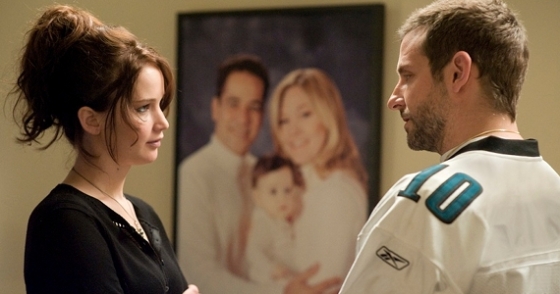Silver Linings Playbook features more football, dancing and talk of gambling than I expected. It also features less in the way of an in-depth approach to mental illness – certainly less than suggested by the beginning – but is still an open, charming romantic comedy.
Pat (Bradley Cooper) is getting out of an institution at the beginning of the film, to go back and live with his parents (Jacki Weaver and Robert de Niro). His goal is to reconcile with his wife, but along the way he meets Tiffany (Jennifer Lawrence), a recent widow and fellow sufferer of mental illness, who both helps and hinders his progress. Being a David O. Russell movie, the film is generous with all its actors, big parts and small, but the two leads shine the most. All the performances work (though Jacki Weaver’s Australian accent comes through occasionally), but it’s a pleasure to just watch Cooper and Lawrence bounce off each other.
So I enjoyed the film a lot. Maybe not ‘tons of Oscars’ enjoyed, but still. However, I also very much see criticism about the film’s treatment of mental illness. We are told right from the beginning that Pat is bi-polar, and to begin with the film does a good job of showing the difficulties that brings with it. There’s an especially nice moment from when Pat and Tiffany first meet when they discuss different medications they’ve been on, and how they made them feel, a conversation I’m very familiar with. But after the first forty-five minutes or so, they progress from ‘actual’ crazy to ‘movie’ crazy, which is a lot funnier and more cinematic but also a very common cop-out when dealing with such things. So often, mental illness in movies is played as a quirk, and while Silver Linings Playbook doesn’t quite cross that line, it gets much closer to it than it seems like it’s going to from the beginning.
It’s not a bad thing that the film is really just a well-made romantic comedy, but it seems like it could be more than that, one that might manage to take a less romanticised view of what people with mental illness go through, or that love can’t conquer all. As I said, I was charmed, and not offended, and definitely enjoyed it. But instead of staying on the track of being about the intersection of love and craziness, it became about American football. And dancing. And gambling. Which made me a little wistful for what it almost was.
